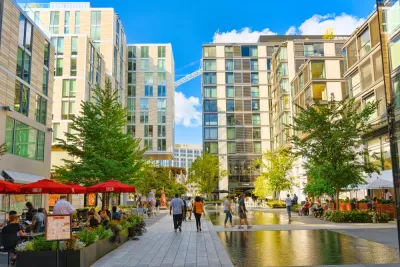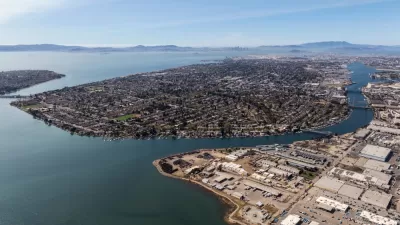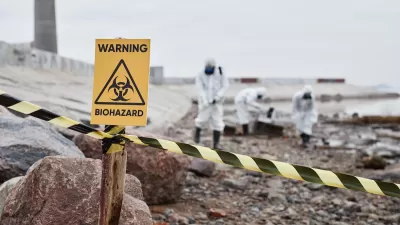The Region United Framework for 2030 outlines a plan for sustainable, equitable development, calling for a 'holistic' approach to regional planning.

Writing in Greater Greater Washington, Ethan Goffman reports on the Metropolitan Washington Council of Governments (COG)’s Region United Framework for 2030, a plan for the future development of the Washington, D.C. region that focuses on equity, transportation, housing, and climate and works to reduce sprawl.
According to Goffman, the updated framework reflects a more concerted focus on equity, the need for which was laid bare by the pandemic’s impact on the most vulnerable populations and essential workers. “While some planners advocated for including these workers before the pandemic, COVID’s disparate impact threw into sharp relief the need for a holistic view of sustainability and inclusion when planning built environments.”
The framework reflects growing support for transit oriented communities (TOC), an update on the traditional transit oriented development (TOD) that centers equity and includes a commitment to ensuring that low-income households aren’t priced out. The framework uses the COG’s Equity Emphasis Areas (EEAs) tool, which identifies “census tracts with high concentrations of low-income people and ‘traditionally disadvantaged racial and ethnic’ groups,” to target investments in transportation, housing, and climate resilience to the areas that need them most. “Beyond housing and transit, TOC requires a comfortable built environment, including safe street crossings, wide sidewalks, and vegetation.”
FULL STORY: How the region’s housing targets can support transit-oriented communities

Study: Maui’s Plan to Convert Vacation Rentals to Long-Term Housing Could Cause Nearly $1 Billion Economic Loss
The plan would reduce visitor accommodation by 25,% resulting in 1,900 jobs lost.

North Texas Transit Leaders Tout Benefits of TOD for Growing Region
At a summit focused on transit-oriented development, policymakers discussed how North Texas’ expanded light rail system can serve as a tool for economic growth.

Using Old Oil and Gas Wells for Green Energy Storage
Penn State researchers have found that repurposing abandoned oil and gas wells for geothermal-assisted compressed-air energy storage can boost efficiency, reduce environmental risks, and support clean energy and job transitions.

Private Donations Propel Early Restoration of Palisades Playground
Los Angeles has secured over $1.3 million in private funding to restore the Pacific Palisades playground months ahead of schedule, creating a modern, accessible space that supports community healing after recent wildfires.

From Blight to Benefit: Early Results From California’s Equitable Cleanup Program
The Equitable Community Revitalization Grant (ECRG) program is reshaping brownfield redevelopment by prioritizing projects in low-income and environmental justice communities, emphasizing equity, transparency, and community benefits.

Planting Relief: Tackling Las Vegas Heat One Tree at a Time
Nevada Plants, a Las Vegas-based nonprofit, is combating the city’s extreme urban heat by giving away trees to residents in underserved neighborhoods, promoting shade, sustainability, and community health.
Urban Design for Planners 1: Software Tools
This six-course series explores essential urban design concepts using open source software and equips planners with the tools they need to participate fully in the urban design process.
Planning for Universal Design
Learn the tools for implementing Universal Design in planning regulations.
Ascent Environmental
Borough of Carlisle
Institute for Housing and Urban Development Studies (IHS)
City of Grandview
Harvard GSD Executive Education
Toledo-Lucas County Plan Commissions
Salt Lake City
NYU Wagner Graduate School of Public Service





























